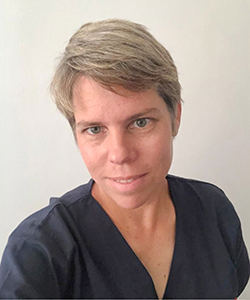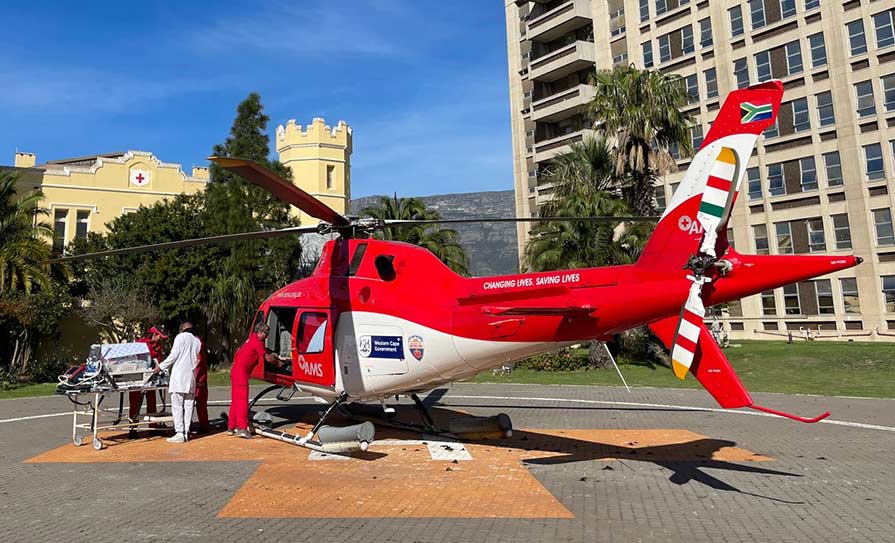Priscilla Lynch recently visited Cape Town, South Africa, as part of her journalism Fellowship. In this feature, she reports on two very different healthcare facilities in the city that provide essential and innovative services in challenging circumstances
With a population of almost 60 million, South Africa faces significant, multifaceted, and interconnected healthcare challenges.
The South African healthcare system is highly unequal and basic access remains a key issue for the majority of the population. There is a stark divide between the State-funded, public, and medical aid scheme, and the health insurance-funded, private healthcare sectors. More than 70 per cent of the population relies on the under-resourced public sector, while the remaining wealthier portion can access high-quality, private care. Rural and urban disparities also exist, with rural areas often lacking adequate healthcare professionals and facilities.
Poor governance, corruption, lingering inequalities from apartheid, and uncertainty over how the controversial new National Health Insurance Bill will be implemented by the latest government are also key challenges.
In addition, South Africa faces a shortage of healthcare professionals, including doctors, nurses, and specialists. Retention of skilled staff is impacted by factors such as workload, working conditions, and migration of healthcare workers to other countries or the private sector. An ongoing healthcare recruitment moratorium is placing further strain on a creaking public system.
South Africa has a very low national life expectancy – just 61.5 years in 2021, according to data from the World Health Organisation. This is further influenced by a multi-faceted disease burden, which includes HIV/AIDS, tuberculosis (TB), diseases related to poor nutrition and exercise habits – heart disease, diabetes, and cancer – and trauma from violence.
South Africa still has one of the highest rates of HIV in the world, despite significant progress in the roll-out of antiretroviral treatment (ART). TB, often linked with HIV, continues to be a major health issue. Drug-resistant TB strains further complicate treatment efforts. As of 2021, eight million people in South Africa were infected with HIV, which is 13 per cent of the country’s total population. Around 450,000 people in the country develop TB every year and 270,000 of those are HIV-positive.
Despite these formidable challenges, the healthcare workforce in South Africa is dedicated and passionate. There is thriving innovation in the provision of services, evident to this writer on a recent trip to Johannesburg and Cape Town.
New Somerset Hospital
New Somerset Hospital is South Africa’s oldest functioning hospital. The foundation stone for the hospital was laid on 18 August 1859, replacing a facility of the same name in Chiappini Street, founded in 1818 as the first civilian hospital in Cape Town. For more than 165 years, New Somerset Hospital has been providing healthcare services to Cape Town residents and has undergone much change to keep up with the demands of the community.
The publicly funded general hospital now offers a comprehensive range of healthcare services, including treatment and support for HIV, AIDS, and TB; emergency care; maternity care; level two neonatology; paediatrics; general surgery; and psychiatry. New Somerset currently has 363 beds, admits approximately 37,000 patients, facilitates around 5,000 births, and performs about 7,000 operations annually.
It is a hospital of many firsts. New Somerset was the first clinical teaching centre in South Africa and was the original academic hospital of the University of Cape Town before Groote Schuur Hospital opened its doors in 1937.
It was the first hospital in South Africa to deracialise its wards after the end of apartheid and it also established the first HIV ART distribution centre in Cape Town in 2005, New Somerset Hospital facilities board member Mr Richard Bougard told the Medical Independent (MI) during a tour of the facility.
Construction is currently ongoing at the hospital’s new 30-bed acute psychiatric unit (APU), which will be equipped with secure and open spaces, therapeutic areas, and isolation units in order to cater to the needs of all residents who require its services. The APU is due to be completed in February 2025.
What happens is you have a group of doctors and passionate people who are driving innovations and processes in a hospital, and making things happen
Last year, work also commenced on upgrading the hospital’s ventilation systems and four existing theatres. Once the work is completed in May of next year, New Somerset’s theatres will have upgraded medical imaging facilities, new cold rooms and theatres, as well as UPS installations in the event of power blackouts. This means that the theatres will remain productive and ready to perform surgeries regardless of ‘load-shedding’. Load-shedding refers to strategic blackouts in South Africa, where citizens are left without power between six to 12 hours a day, due to the country’s energy crisis.
While these much-needed upgrades are very welcome, the older original hospital building, previously called the north wing, is not suited to the delivery of modern medical care, and also requires significant investment. The building is of significant historical and cultural importance, but the beautiful balconies to the front of the original structure need restoration. Meanwhile, inside, plans to further renovate and upgrade the old former ‘Nightingale wards’ are at various stages, Mr Bougard said. One proposal is to provide onsite accommodation for the families of sick children, who sometimes have to travel long distances to reach the hospital.
Prof Heather Bougard is the Head of Clinical Unit for Surgery at New Somerset Hospital. Prof Bougard is also the Chair of the South African Hernia Interest Group and serves on the executive committee of the South African Society of Endoscopic Surgeons.
Prof Bougard, who is married to Mr Bougard, is very passionate about minimal access surgery, and in New Somerset the surgeons perform laparoscopic surgery when possible or appropriate.

Mr Bougard explained that this approach is crucial for both cost containment and faster patient recovery. The latter aspect is especially important when the patient is the primary earner or caregiver, as it allows them to return to their family as quickly as possible.
The hospital serves a large catchment area with high levels of unemployment and poverty. Despite these challenges, the hospital maintains an average post-surgery stay of under 2.5 days. To maximise patient treatment capacity, the hospital collaborates closely with its social work team to manage bed flow efficiently, Mr Bougard told MI.
Diabetes and obesity are growing healthcare issues in South Africa, particularly in the western cape. Bariatric surgery, as minimally invasive as possible, is one of the surgeries offered by the hospital. Mr Bougard pointed out the procedure is very effective for patients, as well as cost-saving for health services in the long-term.
However, both Mr Bougard and Prof Bougard emphasised that despite South Africa’s status as a low-resource country in terms of public health, clinicians remain committed to innovating and providing the latest and best care for their patients.
“What happens is you have a group of doctors and passionate people who are driving innovations and processes in a hospital, and making things happen, so the real entrepreneurs are those working on the ground, because they see things for what they are. Each hospital has its own personality,” said Mr Bougard.
“We always have this premise that maybe we should do the simplest thing [because of resources]. But we want robust outcomes for our patients, we want low complication rates, and that is the reason we perform gastric bypasses… and we find we have really good outcomes,” Prof Bougard added.
Prof Bougard hopes to see the hospital acquire a robotic surgical system and further enhance its laparoscopic surgery capabilities and related training.
“If you get left behind from a technological point of view, it is very difficult to bridge that gap later on, and the more that gap widens, the bigger the deficit you have. So it is really important for us to keep up with what’s going on,” Prof Bougard said.
She stated that despite the high cost of such equipment, patients in South Africa “possibly have a greater need” for this surgical innovation than those in Europe or North America. This is because South African patients often need to return to work and domestic responsibilities quickly to support themselves and their families.
“We know we are very good at driving down costs in healthcare here, but it shouldn’t always be about compromise, I don’t think that it is ethnically appropriate. It is about cutting costs, not quality-of-care.”
South Africa also has a lot of surgical trainees from other parts of Africa, she noted, “which is important for skills dissemination” in the wider continent.
Hospitals in South Africa do not operate to the same level of oversight as in most Western countries, “but what you will find are pockets of excellence… and we try to band together and drive excellence,” said Prof Bougard.
Like many publicly funded health services in South Africa, funding and staffing are inadequate in relation to patient demand. Access to basic healthcare, and to New Somerset Hospital and its services, remains a key challenge for patients, particularly for those who live further away and face transport difficulties, and for those who may lack the skills and supports to arrange referral to the hospital. “Patients are innovative in their own way and try to find a way to get into the system, but others [unfortunately] don’t,” said Prof Bougard.

Men’s health clinic
Just around the corner from New Somerset Hospital is another important, but very different healthcare facility. The Ivan Toms Centre for Health was founded in 2009 and was the country’s first Health4Men clinic.
Health4Men clinics are specialised healthcare facilities that focus on the sexual health and wellbeing of men who have sex with men (MSM).
The centre is named after the late Ivan Toms, an openly gay doctor and conscientious objector during the apartheid era. It is funded by the United States Agency for International Development through FHI 360 and partners with the South African Department of Health.
The centre provides a range of comprehensive sexual health services, including HIV screening and treatment, provision of pre-exposure prophylaxis (PrEP), as well as hepatitis and sexually transmitted disease screening and treatment. It was the first centre to run a demonstration project for PrEP on the African continent in 2015, and is now one of the biggest PrEP providers in South Africa. Most patients at the clinic are MSM, and other vulnerable populations including the trans community.
The centre is a key training institution for service providers in South Africa, and the African region, on MSM health. Approaches developed at the centre have formed the basis for training health services in 10 other African countries to date, in addition to training across all provinces of South Africa.
Speaking to MI, the clinic’s lead specialist, Dr Johan Hugo, Senior Clinical Adviser, Anova Health Institute, said: “It is all about removing barriers to care.”
He explained how the centre, which has a fresh, modern, and discreet décor, “aims to create a space where people feel comfortable” and works to eliminate any “stigma and discrimination”.
In addition to offering onsite testing and health checks, the centre dispenses some medications, aiming to eliminate barriers such as the need to visit a general pharmacy for PrEP or HIV antiretrovirals. Medications are discreetly packaged in generic containers. For those on long-term prescriptions, there is a convenient ‘click and collect’ system: Patients receive a passcode and can retrieve their medications from a secure locker located inside the clinic entrance.
The clinic also provides a community outreach service that goes to rural areas and townships to provide testing and care.
To help increase awareness of its services and promote safe sexual behaviour and testing, the clinic partners with the app Grindr and other online platforms.
The centre is constantly looking at innovative ways to make it easier for clients to access care, Dr Hugo said.
Conclusion
Despite the challenges faced by the South African healthcare system, facilities such as New Somerset Hospital and the Ivan Toms Centre for Health in Cape Town demonstrate pockets of excellence that strive to provide high-quality care against the odds. These institutions not only highlight the resilience and innovation of South Africa’s healthcare professionals, but also underscore the need for continued investment, training, and support to bridge gaps in access and quality-of-care.
Important South African study on pneumonia
The usage of mobile data in public health is a new way to map the spread and evolution of pathogens and their responses to vaccines and antibiotics, which will provide key insights to help predict and prevent future outbreaks. The approach combines a pathogen’s genomic data with human travel patterns, taken from anonymised mobile phone data.
Researchers from the Wellcome Sanger Institute, University of the Witwatersrand, National Institute for Communicable Diseases in South Africa, the University of Cambridge, UK, and partners across the Global Pneumococcal Sequencing project, integrated genomic data from nearly 7,000 Streptococcus pneumoniae (pneumococcus) samples collected in South Africa with detailed human mobility data. This enabled them to see how these bacteria, which cause pneumonia and meningitis, move between regions and evolve over time.
The findings, published on 3 July in Nature, suggest initial reductions in antibiotic resistance linked to the 2009 pneumococcal vaccine may be only temporary, as non-targeted strains resistant to antibiotics such as penicillin gained a 68 per cent competitive advantage.
This is the first time that researchers have been able to quantify precisely the fitness – their ability to survive and reproduce – of different pneumococcal strains. The insight could inform vaccine development to help target the most harmful strains and may be applicable to other pathogens. Many infectious diseases such as tuberculosis, HIV, and Covid-19 exist in multiple strains or variants circulating simultaneously, making them difficult to study.
Dr Anne von Gottberg, author of the study at the National Institute for Communicable Diseases, Johannesburg, South Africa, said: “Despite vaccination efforts, pneumonia remains one of the leading causes of death for children under five in South Africa. With continuous genomic surveillance and adaptable vaccination strategies to counter the remarkable adaptability of these pathogens, we may be able to better target interventions to limit the burden of disease.”
This project was funded by the International Center for Journalists through the Health Innovation call.













As a South African trained doctor, I am so so proud to read this piece. Thank you for giving our Irish colleagues a glimpse of the challenging South African context that drives the wealth of experience and high standard of care delivered by South African doctors.